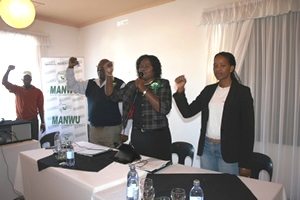 The Metal and Allied Namibian Workers Union (MANWU) has said workers in the sector are being treated like slaves as they work under dangerous and inhuman conditions. According to MANWU secretary general Justina Jonas, these were some of the issues the union’s central committee discussed during its meeting in Walvis Bay in October.
The Metal and Allied Namibian Workers Union (MANWU) has said workers in the sector are being treated like slaves as they work under dangerous and inhuman conditions. According to MANWU secretary general Justina Jonas, these were some of the issues the union’s central committee discussed during its meeting in Walvis Bay in October.
Jonas said some companies pay the workers a minimum wage while others don’t adding that at times, health and safety regulations are not observed. She however applauded most companies which are doing their best in treating their employees well. MANWU also noted that Namibians who are working on the country’s roads and buildings earn a tiny fraction of the huge amounts the construction companies make. According to Jonas, the motor engineering and allied sectors do not have basic benefits and the workers barely get enough to pay for their basic needs.
The union’s other concerns are the transportation of workers on tipper trucks, intimidation by employers regarding joining trade unions, unfair dismissals and victimization.
The MANWU central committee also resolved that Namibians must be given the priority when government tenders are awarded and that unscrupulous employers who have been given tenders but do not comply with labour laws were another thorny issue. The union has asked that trade unions be consulted when foreign investors are awarded tenders.
Namibia has more than 30, 000 metal and construction workers, a representative of mostly low-income workers in the construction, motors, and engineering, metal and wood industry sectors across the country.
In August, Jonas lashed out at the Namibia Building Workers Union after the union signed a recognition agreement with a Chinese-owned construction company which pays its employees N$9 per hour, N$2.11 below the minimum wage. The Chinese company later agreed to pay the minimum wage after consultation with MANWU.
MANWU’S main priorities for the 2012/2015 strategy plan are worker education, collective bargaining, community based education, staff skills development, congress resolution implementation and organising and recruitment drives.